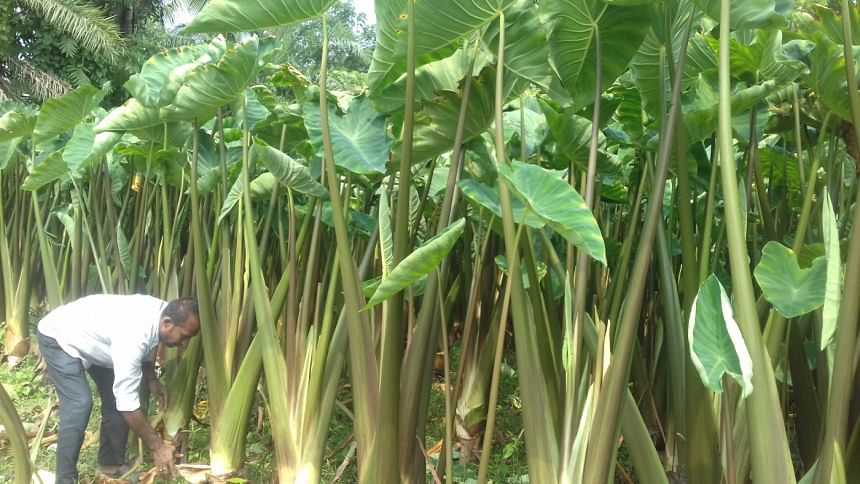Growing popularity of taro

The mammoth 10 feet tall pani kochu (taro) plants are a sight to behold.
A farmer in Dumuria upazila of Khulna has achieved financial solvency for himself and quite literally changed the lives of hundreds of farmers across the country through pani kochu farming.
A fully-grown pani kochu plant can weight up to 30 kilograms and it gives a bang for the buck as the flowers, stems and leaves are all edible.
It was Nuton Mondal, a farmer of Ghona Motherdanga village under Rangpur union of the upazila, who popularised pani kochu farming.
He initially tried his hand out at paddy farming by leasing out five decimals of land. However, he was quick to make a loss as paddy prices were low at the time.
After all, he lacked experience as he had spent the previous 10 years working at a jute mill. He ultimately had to leave his job as he would frequently face respiratory illness for the jute dust.
He did not want to leave his land barren after his failed attempt in paddy, and so he first planted pani kochu in 2006, by collecting a few saplings from the roadside.
He dug a foot into the ground to plant the saplings, while each sapling was spaced three feet from each other.
These plants fare well in the shade and on mushy grounds and are sown in the months of December and January; it can be harvested in about three months.
In 2012, Nuton posted a picture of his pani kochu plant on Facebook and set a price of Tk 100 for each plant. He immediately got a good response.
There was no looking back for Nuton since then.
To further his expertise in market linkage and farming techniques, Nuton joined a Common Interest Group of farmers in 2015 under the National Agricultural Technology Programme phase -2 (NATP-2) of the agriculture ministry.
The 42-year-old said the application of proper techniques has helped.
“I already have orders for four lakh pani kochu saplings this season,” he said, while tending to his field near the Daulatpur-Sahapur road, about 10 kilometres from Khulna-Jashore highway.
“The use of modern tools like Facebook and bKash has helped my business grow.”
Last year, he recorded sales worth Tk 6 lakh, including stems worth Tk 1 lakh and saplings worth Tk 2 lakh.
This year, he is selling the stems for Tk 35 to Tk 40 a kilogram. Each plant sells for Tk 40 to Tk 100, depending on the size, each sapling for Tk 3, and each flower for Tk 1.
His biggest order of 63,000 saplings is from Gaziur Rahman, an expatriate who owns lands in Habiganj.
With help from Department of Agricultural Extension (DAE) in Dumuria, Nuton sold over two million saplings across 50 districts, including Dhaka, Barishal, Barguna, Kushtia and Narail, until now.
In addition, he carries his produce by van to sell in kitchen markets in Khulna every day.
“To eradicate unemployment, the youth could easily take up pani kochu farming,” he said.
“My dream is to help train as many farmers as possible in pani kochu farming, as it is more profitable than paddy or other vegetables. There is an export potential for this crop as well.”
It has huge demand in South Korea, as the plant is used in their cuisine.
Nuton is currently in talks with a Korean buyer to set up a processing factory in Khulna, which will present an opportunity for local farmers.
“To export a kilogram of pani kochu, I need to process 20 kg of raw pani kochu. As such, buyers are giving a target of 5,000 kg a day.”
Seeing Nuton’s success, about 1,000 farmers from at least seven villages adjacent to Dumuria, including Ghona Motherdanga, Rangpur, Soluya, Bandha, Dhanibunia and two villages Balabunia and Khalashibunia under Batiaghata upazila, have started growing pani kochu after buying saplings from Nuton.
Pritish Mondal, a farmer of Ghona Bandha village in the upazila, told The Daily Star, “I earned Tk 60,000 from selling the pani kochu stems from one bigha of land last season. In the upcoming season, I expect to double that amount.”
Dumuria Upazila Agriculture Officer Mohammad Mosaddek Hossain said pani kochu farming is easier than farming other crops, as it requires less nurturing and pesticides. The plants can be harvested within three months and give yield for six months, he added.
“Nuton is an idol to all farmers in the area.”

 For all latest news, follow The Daily Star's Google News channel.
For all latest news, follow The Daily Star's Google News channel. 



Comments